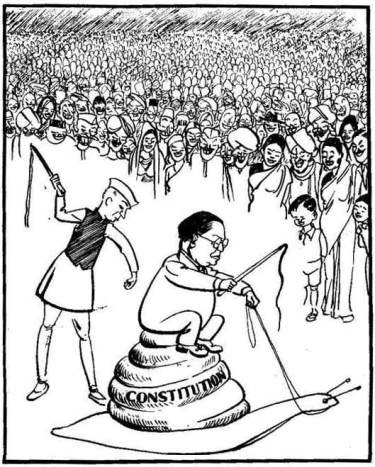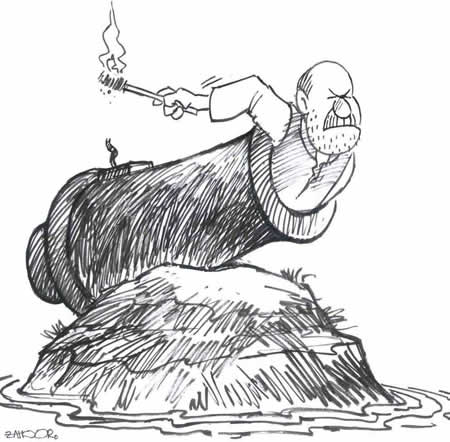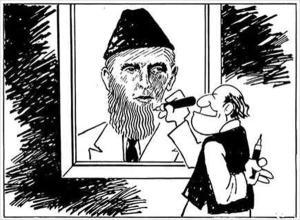Why Pakistan Never Became Democratic

For every beneficial outcome, modern India’s commentariat, is in a motivated hurry to credit British (and the West in general) and blame Indian leadership for every injurious development.
|
Bad Sector
From August 15th, 1947, till January 26th, 1950, India had no constitution, laws, or an elected government. Thus for a brief period, short of 30 months, India Government ruled by decree.
Consensus prevailed.
Going by contemporary narratives, Nehru drove the pace of constitution building. Known detractors of the Indian nation, like Homi Mody were invited into the Constituent Assembly – itself headed by a leader of the dispossessed, Dr.Ambedkar.
Talking heads of the Y2K generation claim that the Indian nation, constitution, parliamentary notions, democratic mechanisms were all a gift of the British.
Merits of the British Raj
First, if the British were so good, why have they not been able to save their home economy?
Care to remember that British ideas of democracy, freedom, were all for show to the subject races? Indian subjects had no representation, redress, were inveigled into sham consultations, as the Indian economy sank into a morass of debt, stagnation, poverty, disease and famines.
This was the true inheritance from the British.

Even though some reports suggest that this was a 1950’s cartoon, it was probably before January 26th 1950, when the Indian Constitution was adopted by the Indian Constituent Assembly. ToI suggests that this was a 1948 cartoon. | Copyright – Children’s Book Trust; source and courtesy – outlookindia.com | Click for source image.
KM Munshi, India’s food minister travelled the world over, seeking food aid. In New York, he described India’s precarious situation as ‘ship-to-mouth.’ Indian Railway infrastructure was in tatters. Ghastly accidents occurred with numbing regularity. India built the entire system of Railways that we see today, over the next 40 years.
MN Roy (founder of Indian Communism), Homi Mody (industrialist) represented realism of the time.
At that time in history, it seemed pragmatic to support the Raj.
A little further
While on the subject of British legacies and inheritances, next door Pakistan had exactly the same inheritance as India.
The Pakistani experience on constitution writing is illustrates the ‘value’ of the British legacy.
There will be many commentaries, to explain Pakistan’s lurch from crisis to crisis, dictatorship-to-dictatorship.
A recent article in Pakistan’s The Dawn makes for interesting reading.
Prime Minister Liaqat Ali is accredited with a number of ground breaking contributions. He decided to ally with the US in the Cold War divide; quashed a coup attempt by communists; promoted General Ayub to the highest rank and fought a war with India over Kashmir to name just a select few. His government ruled on ad hoc basis under temporary laws as it could not formulate and build a consensus on a constitution for the country
They could not dig out a monarchy to rule the country nor could they install a Caliph. The constitution has to be based on democracy. But the problem was that Meerut was now in India. The most powerful Prime Minister serving for one of the longest periods in the history of Pakistan had no constituency in the country to contest elections from. A committed democrat and an active parliamentarian, he knew well that he and his political class had no, or at best a very shaky, future under a democracy. In contrast, Bacha Khan’s was a completely secure political position. It was impossible to democratically uproot him from his constituency. He had voters, volunteers and diehard loyalists.
The ad hoc powers were thus used to change the rules of the game.
Six months after the death of Muhammad Ali Jinnah, Prime Minister Liaqat Ali Khan moved the Objective Resolution in the Constituent Assembly that introduced Islam as the raison d’être of the new country. Religion was pitched against ones linguistic and cultural identity and faith was made to rival political interests. Those loving their culture, defending their language and demanding their democratic and political rights on these bases became heretics conspiring against the last citadel of Islam in the Subcontinent. Ideological boundaries of the country became more important than the limits of electoral constituencies and principles of democracy were contrasted to injunctions of Islam as defined by the select ulema.
Bacha Khan who enjoyed a hard earned and unflinching popular support in a vast constituency went down in our official gazettes as an anti-Pakistan traitor. Red Shirts were hounded and hunted. Politicians were jailed and elections were rigged.
By declaring the entire country as one constituency and setting ones perceived Islamic credentials as the only qualification, Liaqat Ali Khan tried to create a constituency for his class – the politically insecure Muslim elite that had migrated from the Muslim minority provinces of India. But ironically, they could not sustain their hold on this constituency for long. Within a decade they were outdone by the Army in the game they had pioneered. They were declared incapable of defending the citadel of Islam. The army took over the ‘responsibility’ of keeping the country united in the name of Islam and secure from the conspirators who had strong democratic constituencies in the country.







 Exciting new series. From 1 Mar, 2010.
Exciting new series. From 1 Mar, 2010.
The opposition parties, especially the PMLN, are often engaged in a free-for-all effort to dislodge the federal government. As the PMLN cannot replace the PPP-led federal government in the National Assembly, it has attempted to resort to street agitation to achieve this objective. It also hopes that the Supreme Court or the military will remove this government. The Punjab Chief Minister (PMLN) has openly preached defiance of and street agitation against the federal government on electric power shortages. The open support to culture of violence is a dangerous development because, in the long run, street agitation and violence undermine democracy. Pakistan is currently facing deep-rooted structural problems that can cause a total collapse of the political system or it may function only at the minimum level. All political parties and state institutions need to work together within a democratic constitutional framework to address these problems. If the current power struggle continues unabated, neither the present democratic order nor an authoritarian or technocratic arrangement can salvage the situation.